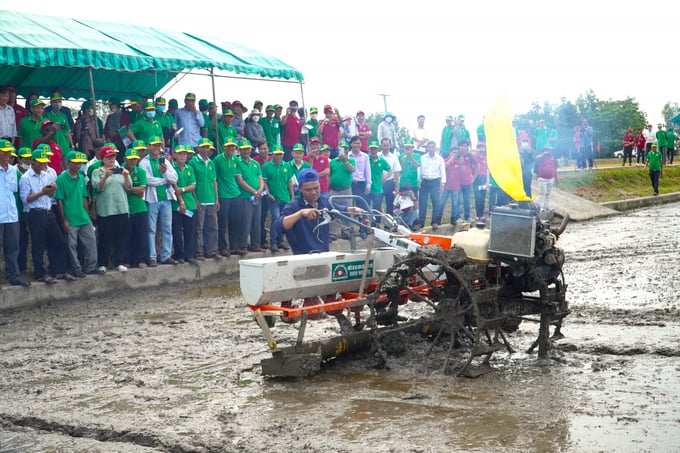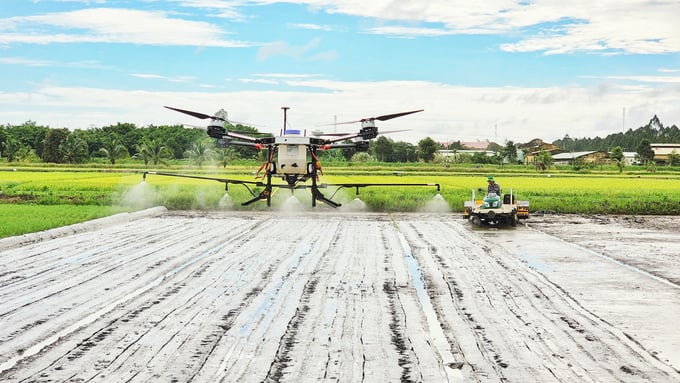November 24, 2025 | 18:28 GMT +7
November 24, 2025 | 18:28 GMT +7
Hotline: 0913.378.918
November 24, 2025 | 18:28 GMT +7
Hotline: 0913.378.918
Aiming to build a Vietnamese rice brand that focuses on greenhouse gas emissions (GHG) reduction and climate change adaptation, on the 50-year journey of human and technological development, the International Rice Research Institute (IRRI) always works with the Ministry of Agriculture and Rural Development to bring mechanization technologies into sustainable rice production models, meeting the criteria of reducing inputs and losses while increasing income from increasing the value of rice and straw through emission reducing rice cultivation processes.

The cluster charger is improved to suit the Mekong Delta’s land, which proves to be effective in terms of reducing costs, reducing emissions, and improving profits. Photo: Kim Anh.
Dr. Nguyen Van Hung, senior scientist, Head of the Mechanization and Postharvest Division of IRRI, said, “One of the obstacles existing in rice production in the Mekong Delta is the sowing density, which is currently higher than 100 kg/ha, leading to costly fertilizer investment and increased risk of disease. The traditional sowing method makes rice prone to fall. As a result, production loss during harvest is inevitable”.
In recent years IRRI has cooperated with many domestic and foreign mechanization enterprises to standardize the first step in the rice production chain, which is the sowing stage. A series of precision sowing machines have been put to the test and have many improvements in line with the current state of all the fields in the Mekong Delta. The equipment contributes to encouraging farmers to apply mechanization in precise sowing practices, increasing farming efficiency, and promoting GHG reduction in rice production in the Mekong Delta.

Reducing environmental pollution and greenhouse gas emissions is the most important criterion for the cluster seeding machine to receive farmers’ interest. Photo: Kim Anh.
Dr. Nguyen Van Hung estimates that each kilogram of rice produced by mechanized precision sowing can reduce greenhouse gas emissions by more than 10%. Moreover, not only reducing input, farmers can also increase output with uniform productivity, proving that changing production methods made rice farming more efficient, accurate and quality.
According to experts from the World Bank, lessons from the VnSAT project show that the application of the “1 must, 5 decrease” technique in rice farming can increase yield by 5%, increase net profit by 28.6% and reduce greenhouse gas emissions by approximately 8 tons CO2e/ha/year.
The World Bank's study on agricultural land use and sustainable livelihoods in the Mekong Delta region also points out that this region has the potential to reduce 12 - 23 tons of CO2e by promoting Climate-Smart Agriculture (CSA) and Good Agricultural Practices (GAP), replacing inefficient rice land with climate-smart farming systems, reducing post-harvest losses and better management on straw.

The Ministry of Agriculture and Rural Development has set a target that the area of specialized high-quality rice cultivation in the whole Mekong Delta region will exceed 500,000 ha, followed by the goal of 1 million ha planted and the rice output reaching 6.2 million tons by 2025. Photo: Kim Anh.
To ensure green growth criteria, rice farmers at present must ensure several technical factors such as not using fertilizers and pesticides outside the permitted list; increasing the use of organic fertilizers and biological fertilizers; normalizing application of alternate wet-dry irrigation techniques; removing rice straw from the field to reuse, process and improve the efficiency of fertilizer use; using salt-tolerant, pest-resistant rice varieties.
According to preliminary estimates from the Ministry of Agriculture and Rural Development, the “Scheme for sustainable production of 1 million ha of high quality rice in the Mekong Delta“ has the potential to reduce greenhouse gas emissions by over 11.5 million tons of CO2e in 2030, inheriting the achievements of the VnSAT project.
In addition to the cultivation process, the draft of the scheme also offers a number of technological solutions and mechanization activities to support rice production such as laser-controlled land leveling techniques for soil reclamation to optimize crop and water management; mechanization of precision sowing; harvest and post-harvest management to meet the needs of mass harvesting to reduce losses during harvesting and transportation; sustainable management of rice straw, especially not burning straw causing environmental pollution, ensuring biodiversity, meeting the emissions reduction standards.
The fourth Global Conference of the Sustainable Food Systems Programme is scheduled to be held from April 24 to 28 in Hanoi. The event receives attention from many ministers, deputy ministers, and heads of sectors from countries and international organizations.
The 4th global conference of the Sustainable Food Systems Programme will contribute to the 2023 Stocktaking Moment of the UN Food Systems Summit follow-up process by focusing on how food systems need to be transformed to overcome the multiple deeply rooted and interlinked crises of climate, biodiversity, conflict, energy, prices, hunger, malnutrition, and health to achieve the sustainable development goals (SDGs).
As the host country of the fourth conference, Vietnam will have the opportunity to share with other countries, United Nations organizations and international organizations about the efforts, results and the process of Vietnam's food system transformation.
The opening session is scheduled to be held on the morning of April 24, followed by thematic sessions. The SFS Program's closing meeting and the Multi-Stakeholder Advisory Committee (MAC) are scheduled to be held on the afternoon of April 27 and the morning of April 28.
For more information, please visit the links below:
https://www.oneplanetnetwork.org/programmes/sustainable-food-systems/4thconference
https://nongnghiepmoitruong.vn/hoi-nghi-toan-cau-he-thong-lttp-channel46/
Translated by Samuel Pham

(VAN) Dong Thap promotes agricultural restructuring, forms large specialized farming zones, raises the value of agricultural products and develops toward ecological and high-tech directions.
/2025/11/22/4018-4-213342_747.jpg)
(VAN) The Mekong Delta Agricultural Experts Club has attracted 143 experts and researchers to participate in providing consultancy and contributing initiatives to the development of one million hectares of high-quality rice.

(VAN) Ca Mau’s development of OCOP products opens a path to increasing cooperatives value, helping boost income, expand markets, and affirm collective economy's role.

(VAN) Turning seemingly ordinary coconut shells into unique jewelry and artwork, Nguyen Bang Nhi spreads the value of local culture through her brand, Cocohand.

(VAN) Results from the Sustainable Durian Model Project in Dak Lak have confirmed the critical role of Yara Viet Nam in transferring advanced nutritional solutions to farmers.

(VAN) In Tuyen Quang province, livestock farmers have introduced effective models and innovative practices that significantly strengthen African Swine Fever prevention and control efforts.

(VAN) This is the study conducted by IRRI and Can Tho University on the rice straw value chain in Mekong Delta showing an economic potential of more than 6.6 trillion VND/year.